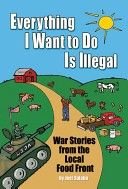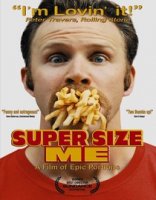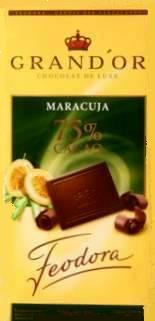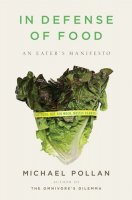 Everything I Want to Do Is Illegal: War Stories from the Local Food Front. by Joel Salatin (Polyface Inc., Swoope, Virginia, 2007)
Everything I Want to Do Is Illegal: War Stories from the Local Food Front. by Joel Salatin (Polyface Inc., Swoope, Virginia, 2007)
Until now, I've written more about Joel Salatin than I've read by him: almost a year ago in Strange Bedfellows? Not Really, and three months later in my review of The Omnivore's Dilemma. Wanting to correct that sin of omission, I grabbed the only one of his books available in our local library: Everything I Want to Do Is Illegal.
On every side, our paternalistic culture is tightening the noose around those of us who just want to opt out of the system. And it is the freedom to opt out that differentiates tyrannical and free societies. How a culture deals with its misfits reveals its strength. The stronger a culture, the less it fears the radical fringe. The more paranoid and precarious a culture, the less tolerance it offers. When faith in our freedom gives way to fear of our freedom, silencing the minority view becomes the operative protocol. — Joel Salatin
Salatin wants to opt out of a little more of the system than I do, but I hear his cry. You could call him bitter, but if you consider the miracle that is Polyface Farms, you have to wonder why our government is working so hard to stamp out such elegant, inexpensive, healthy, delicious, and truly "green" (in a conservationist sense) endeavors. (More)
Permalink | Read 5253 times | Comments (1)
Category Reviews: [first] [previous] [next] [newest] Politics: [first] [previous] [next] [newest] Children & Family Issues: [first] [previous] [next] [newest] Food: [first] [previous] [next] [newest] Conservationist Living: [first] [previous] [next] [newest]
With all the fuss lately about illness caused by salmonella in eggs from factory farms with highly dubious practices, it was especially delightful to take a trip—farther than the grocery store, but closer than our church—to Lake Meadow Naturals farm. They have a pick-your-own program on Saturday mornings, and we did just that, reaching under the hens to retrieve a dozen warm-from-the-hen eggs, at a price of $3.50.
Unlike many of that designation, these hens really are free-range: they were ranging all over the yard when we arrived, along with several other types of fowl, including guinea hens, which are the pest control service, being voracious eaters of ticks and other nasty bugs.
I really liked the look of the place, and the friendliness, and hope to return many times for wonderful, fresh eggs. I'm a little disappointed that the yolks are not the deep orange color of the eggs Heather gets from her farming friends, and of the eggs we ate at the bed and breakfast in the Ticino part of Switzerland. But there's no doubt these chickens are healthy, free-range, and lovingly cared for, so I'll be happy with that. Maybe when their less-common breeds are laying I'll notice more of a difference.
We also bought two duck eggs, which were good, but not sufficiently discernable from chicken eggs to encourage a wholesale switch, since we paid $1 each for them. Maybe next time we'll try the guinea hen eggs. :)
Living with other people for several weeks is a good way to experience new foods and new food combinations. If those other people happen to live in another country, the opportunities multiply. And if they also subscribe to a local organic farm's weekly vegetable delivery, well...you get to try Swiss chard. Verdict? Not bad, though I think I'll like it better mixed with other things, such as in an omelet or on a pizza. It's related to beets, but I find the taste more like spinach. As it was with Heather and Jon's Community-Supported Agriculture farm in Pittsburgh, the weekly vegetable lottery is fun to play, and Stephan (like Jon) is particularly good at figuring out how to make good use of fennel, fresh tarragon, and eggplant as well as potatoes, lettuce, and zucchini.
What's a visit to Switzerland without trying a new variety of chocolate? When Stephan brought home a bar of dark Ovomaltine, I was at first skeptical. (More)
I left the new family to their own devices on Saturday morning, when Stephan's mom whisked me away for an adventure. There is a small farm in nearby Riehen which, as I understand it, specializes in biodiversity/heritage breed conservation of berry plants. On this day, they opened their farm to the public for tasting! We could take nothing away, not even by purchase, but were welcome to taste and enjoy all we wanted.
(Somewhere therein is a metaphor for life, I'm certain.) (More)
Permalink | Read 3410 times | Comments (2)
Category Travels: [first] [previous] [next] [newest] Everyday Life: [first] [previous] [next] [newest] Food: [first] [previous] [next] [newest] Conservationist Living: [first] [previous] [next] [newest]
The Rest of the Story. The true revolution behind Jamie Oliver's Food Revolution television show was based in Connecticut and played out quietly, behind the scenes, in West Virginia. Oliver still deserves much of the credit—it was his idea and he funded it. We the People deserve less, for preferring a confrontational and hyped-up TV version to the more inspirational true story. (Hat tip to DSTB.) (More)
What could be more American than hot dogs?
Lawsuits, apparently.
I bought a package of hot dogs yesterday. I'm probably a little behind the times—we don't eat hot dogs very often—but since when did they come with warning labels? Not the kind of warning I might expect, e.g. "this product is full of fat and dangerous additives, and is made from parts of the animal you don't want to know about," but the following:
CHOKING WARNING
For children under age 6, cut hot dogs lengthwise and crosswise into small bite-sized pieces. Children should always be seated and supervised while eating.
Come again? You must be six years old to eat a hot dog? I remember the day when hot dog-shaped meat sticks were a staple toddler "first finger food" in the baby food section of the grocery store. Not that we ever bought them: they were disgusting. But there they were. Clearly, somebody sued somebody over a hot dog incident, and now we get warning labels.
The chief problem with such inanities is that they lead to a cavalier attitude towards all warning labels. In between "children under six must have their hot dogs cut into tiny pieces" and "remove plastic from pizza before putting into oven," someone's going to miss "poison—do not drink."
Our Memorial Day celebration concluded with a lovely dinner at at a friend's house, to which we brought wine and dessert. This friend is one of those on whom I am not hesitatant to inflict culinary experiments, and this cake was one. I began with a simple vanilla cake base from my Boston Cream Pie recipe (credit my friend LCS). It is a single-layer cake, which I sliced in two horizontally with a serrated bread knife. I heated passionfruit jam a bit to make it thinner, and mixed it well to make it smooth. This I spread generously on the first layer. After adding the second layer, I used a pastry brush to glaze it and the sides with the thinned jam. Then I added the fruit: fresh strawberry halves and whole blueberries, canned apricot halves and peach slices. Using the brush again, I glazed the fruit with the jam.
I must say we were all very happy with it! Apricot or currant jams are more traditional for this sort of dessert, but I think the passion fruit flavor made this cake the success it was.
What I plan to do differently next time (and there will be a next time):
- Use a higher percentage of whole wheat flour in the cake. (This time I used a 50/50 mixture of white whole wheat and all-purpose flours).
- Use less sugar in the cake (the recipe calls for 1 cup, but I think less would work well—the jam makes it sweet enough).
- Possibly make the inner layer of jam thinner.
- Use fresh fruit exclusively if I can't find firmer canned fruit; the apricots and peaches were rather mushy—though that did make cutting the cake easier than firm fruit would have.
Food Rules: An Eater's Manual by Michale Pollan (Penguin, New York, 2009)
Food Rules is a condensation of what journalist Pollan has learned from his investigation of what's wrong with the American diet and how it can be improved. If this is the only Pollan food book you will read, or if you want to introduce his ideas to a skeptical friend with a short attention span, it rates five stars. Half of the 140 pages are merely pictures, and the other half are short and very easy to read.
I enjoyed reading through it, but am glad I borrowed it instead of buying it, as for my purposes The Omnivore's Dilemma and In Defense of Food are better. (On the other hand, at $6.60 from Amazon, the book costs no more than one of those fast food meals Pollan wants us to avoid.)
From #1 Eat food (as opposed to edible food-like substances) to #63 Break the rules once in a while, following these succinct suggestions would go a long way towards improving most people's diets. Best of all I like Pollan's relaxed attitude that reminds us that eating well isn't rocket science, nor is it onerous. It's a basic birthright that we have lost and must reclaim for ourselves and our children.
 Super Size Me (Sony, 2004, PG-13)
Super Size Me (Sony, 2004, PG-13)
When Morgan Spurlock was growing up, his mother made the family's meals at home; they ate at restaurants only on very rare, special occasions. Once a common scenario, it is no longer true for Fast Food America.
Spurlock, young, healthy, and in fine physical condition, turned himself into a human guinea pig to investigate the health effects of fast food: For 30 days, he ate at McDonalds, and only McDonalds, three meals a day, every day. His progress (regress) was evaluated and monitored by three doctors, who expected to see no more problems from his change of diet than a moderate rise in his triglyceride levels. Instead, nearly every aspect of his physical and mental health disintegrated rapidly; it took him more than a year to recover from his month-long binge.
Super Size Me is a dramatic condemnation of the fast food industry, and even more so of modern America's eating habits. However, it would have been more effective, if less dramatic, had Spurlock have eaten reasonably instead of deliberately (and sickeningly) gorging himself at every meal. He conflates problems of food quality and food quantity, muddying the results.
The movie is somewhat interesting, but I'd rate it worse than PG-13 for sexual content and language. Unlike some reviewers, I don't find the graphic bariatric surgery to be a problem, but I wouldn't watch it while eating.
 Can Trader Joe's be far behind?
Can Trader Joe's be far behind?
Central Florida now has its very own Penzeys store, in the lovely Park Avenue area of Winter Park. It opened unofficially for a few hours yesterday, and today for real; we walked through the doors an hour after opening. I am so excited.
I know, Penzeys can be considered the Cadillac of spices, as befits the Park Avenue location. You can certainly find herbs and spices for less money elsewhere. But there are times when it's worth paying a little extra for quality, and quality is where Penzeys excels. Variety, too—they have exotic herbs and spices I'd never heard of, plus a stunning variety of their own excellent blends. They even excel in quantity, from tiny jars for the spices you use rarely, to large bags (at a commensurately lower per-ounce price) for greater needs.
It was particularly fun shopping today, as I bought only what I wanted, and in smaller quantities than usual. Herbs and spices lose their potency after a while, but I've been accustomed to ending a Penzeys visit with a large armload, since I either (1) didn't know when I'd have another chance to get to a store, or (2) wanted to make the most of my shipping charges for an online order. Now I can buy small amounts, and when I run out, plan a spicy date: get to Winter Park early enough to find a good parking space, visit Winter Park Honey and other friends at the Farmer's Market, then eat breakfast at Croissant Gourmet while waiting for Penzeys to open. Works for me.
 Ever since our visit to Rio de Janiero, where we began each morning with suco de maracujá sem açúcar, out-of-this-world unsweetened passion fruit juice, I have been on the alert for passionfruit flavors. Alas, nearly every version of passionfruit juice sold here is sweetened, which does a serious disservice to the noble fruit.
Ever since our visit to Rio de Janiero, where we began each morning with suco de maracujá sem açúcar, out-of-this-world unsweetened passion fruit juice, I have been on the alert for passionfruit flavors. Alas, nearly every version of passionfruit juice sold here is sweetened, which does a serious disservice to the noble fruit.
However, if you're going to adulterate the passionfruit, the Feodora Grand'Or Maracuja 75% Cacao chocolate bar is a good way to go. Porter found this German delight for me in New York City. At 75% cacao, the chocolate loses a little too much of its "mouthfeel" to be perfect, but the maracuja flavor is heavenly. Don't pass this up if you get the opportunity to taste some.
CNN Health reported a study in which rats, allowed unlimited access to bacon, sausage, cheesecake, frosting, and other high-calorie foods, developed brain changes similar to those in rats given free access to cocaine or heroin. People are not rats, the scientists are quick to point out, but the findings are suggestive. I'm not so happy that their goal seems to be developing a pharmaceutical approach to both drug addiction and obesity, but I found the following thought-provoking:
So...Coca-Cola originally had cocaine as one of its ingredients...now it has high fructose corn syrup. No wonder it's so popular. :)The fact that junk food could provoke this response isn't entirely surprising, says Dr.Gene-Jack Wang, M.D., the chair of the medical department at the U.S. Department of Energy's Brookhaven National Laboratory, in Upton, New York.
"We make our food very similar to cocaine now," he says.
Coca leaves have been used since ancient times, he points out, but people learned to purify or alter cocaine to deliver it more efficiently to their brains (by injecting or smoking it, for instance). This made the drug more addictive.
According to Wang, food has evolved in a similar way. "We purify our food," he says. "Our ancestors ate whole grains, but we're eating white bread. American Indians ate corn; we eat corn syrup."
The ingredients in purified modern food cause people to "eat unconsciously and unnecessarily," and will also prompt an animal to "eat like a drug abuser [uses drugs]," says Wang.
Janet alerted me to Jamie Oliver; DSTB followed up with what is apparently a new show on ABC. It starts next Friday, but the pilot was shown last night; fortunately it's available both at the show site and Hulu, so I was able to watch it. Jamie's attempt to get the people of Huntington, West Virginia to take a healthier approach to eating has the faults of American commercial television (just as does Who Do You Think You Are?), but it's not bad and (so far) is not as over the top as what I've seen of his British shows. If his personality is a little too dramatic for my taste, there's no doubting the sincerity of his preaching and his mission. His gospel is good, fresh food, and in this episode he takes on school lunches.
[Excuse me, school meals. The only meal these children eat at home is dinner. In Oliver's unfeigned horror at the meals served at our public schools, he misses what strikes me as the more important point: Why are all these children eating school food? Why aren't they bringing lunches from home, and why, for Pete's sake, don't they eat breakfast before going to school? If the schools are going to offer food, certainly it should be healthy food, but where are the parents? There's absolutely no need to subject one's children to American public school food, good or bad. The school lunch (and now breakfast) program does serve a useful purpose, making sure children whose parents can't provide meals for them aren't trying to learn on empty stomachs. That's a good thing. But somehow the whole system got skewed; I know that the goal of the school lunch program at our kids' school was to have everyone participate. (We didn't.) I saw not one lunchbox in the show. I hope that while he teaches the adults how easy it is to put together healthy meals, he also teaches the kids how easy it is to make their own healthy lunches. But that's another issue; I know I'm taking on a Great American Icon by dissing the school lunch program.] (More)
 In Defense of Food: An Eater's Manifesto, by Michael Pollan (Penguin, New York, 2008)
In Defense of Food: An Eater's Manifesto, by Michael Pollan (Penguin, New York, 2008)
I'm in the middle (okay, the beginning) of two rather hefty books at the moment, Susan Wise Bauer's The History of the Ancient World, and my latest review book from Thomas Nelson, The Chronological Guide to the Bible. It's great to be reading the two of them together, though that means it will be a long time before I can review either one.
And now longer still, as the library e-mailed to let me know that I'd made it to the top of the waiting list for In Defense of Food. Michael Pollan is shaping up to be the next John Taylor Gatto for me: a modern author whose books I simply can't resist and can't put down. Reading was the easy part; reviewing without quoting from every page is the difficulty. The book is bristling with my neon green and pink sticky notes. (More)
Jamie Oliver, a British chef, is apparently a big hit in Europe. (Perhaps here, too; that I had never heard of him doesn't mean a lot.) He has cooking shows, a Tupperware-style home party business, and has taken on school meals in England and the eating habits of an entire West Virginia city. I find his flamboyant style annoying, and some of his information dated or controversial (e.g. demonizing saturated fat without mentioning the more problematic trans fats), but there is still plenty worth watching. (H/T Janet)
Grandchild warning. Forty-five years ago, my British-born Girl Scout leader explained to us some of the differences between the US and the UK when it comes to acceptable and unacceptable language. Some words considered normal here were horribly offensive there, while certain words for bodily functions were unacceptable here but commonplace there. She tried to clean up her language in deference to her adopted country, but sometimes slipped—hence the explanation. Oliver's videos are best watched without grandchildren in the room.
Oliver's TED lecture on teaching children about food and good eating habits. He's not a great speaker in this context, but I like the format better than the other videos. He's a little too inclined to look into non-personal (i.e. government and business) solutions, but an important message nonetheless. If nothing else, this one's worth it for the clip at 11:16 where he asks schoolchildren to identify foods in their natural state—and they are baffled by tomatoes and potatoes.


